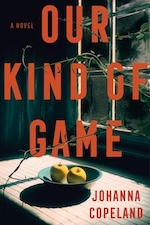
[This interview is reprinted with permission from www.workinprogressinprogress.com.]
Give us your elevator pitch: what’s your book about in 2-3 sentences?
I first described the book as, “It’s about women who do bad things to violent men,” which always got an “Oooh!” My team at Harpers softened it to “A book that asks what it means for a woman to be in control of her own life.”
Which character did you most enjoy creating? Why? And which character gave you the most trouble, and why?
Paula, Paula, Paula! She was, by far, the most difficult character to write because her voice is so particular. With limited formal education and an undiagnosed learning disorder, her voice is less educated, but I needed readers to trust and respect her intelligence. It was a difficult balance, but with each subsequent draft she became my favorite character because Paula functions as the moral center of the book.
Tell us a bit about the highs and lows of your book’s road to publication.
The road to publishing this book has been ridiculously fun. Like the Anne Hathaway movie about a woman who gets a book published. In brief, this book was pre-empted by my favorite editor of the group who made offers. Since that time, my team has been amazing. However, this experience comes after starring in no less than three horror movies filmed over the previous decade, where a woman questions her life choices after going out on endless rounds of fruitless submission.
What’s your favorite piece of writing advice?
Persevere, but be kind to yourself. I’m good at the first part of that advice and terrible at the second part. I always forget that writing is actually hard work. As though plot, setting and dialogue should just flow, right?!? When they don’t, I assume the problem is me. This is when I have to take a step back and remind myself that writing is actually a difficult job and I shouldn’t be so mean to the writer.
My favorite writing advice is “write until something surprises you.” What surprised you in the writing of this book?
So many of the twists in this book revealed themselves as I was writing it. That’s something that always happens, but still catches me by surprise. I wish I wrote from an outline so I could avoid the stress of not knowing how outstanding threads will weave into the plot, but I’m just not that person. In this book, there’s a twist/reveal in the last chapter that didn’t come until the fourth revision. It was hanging out there unresolved, then suddenly it clicked. For me, those moments are the most surprising and satisfying parts of novel writing.
Who is your ideal reader?
Our Kind of Game is marketed as a domestic thriller or women’s fiction, which makes it a little weird that my ideal reader is men in heterosexual relationships. While it’s a cathartic read for women, the men who’ve read it tell me it challenged their perceptions around the way they think about their partner’s domestic labor. I can’t imagine a better outcome for a reader than a book that challenges preconceived notions and entertains.
Inquiring foodies and hungry book clubs want to know: Any food/s associated with your book?
Ahahaha, I have a great recipe for canned cherries! I can’t say anything else without it being a spoiler, but after people read this book, they’ll understand why that question made me laugh out loud.
*****
READ MORE ABOUT THIS BOOK: https://www.harpercollins.com/products/our-kind-of-game-johanna-copeland?variant=41141589966882
ORDER THIS BOOK FOR YOUR TBR STACK: https://bookshop.org/p/books/our-kind-of-game-johanna-copeland/21024793
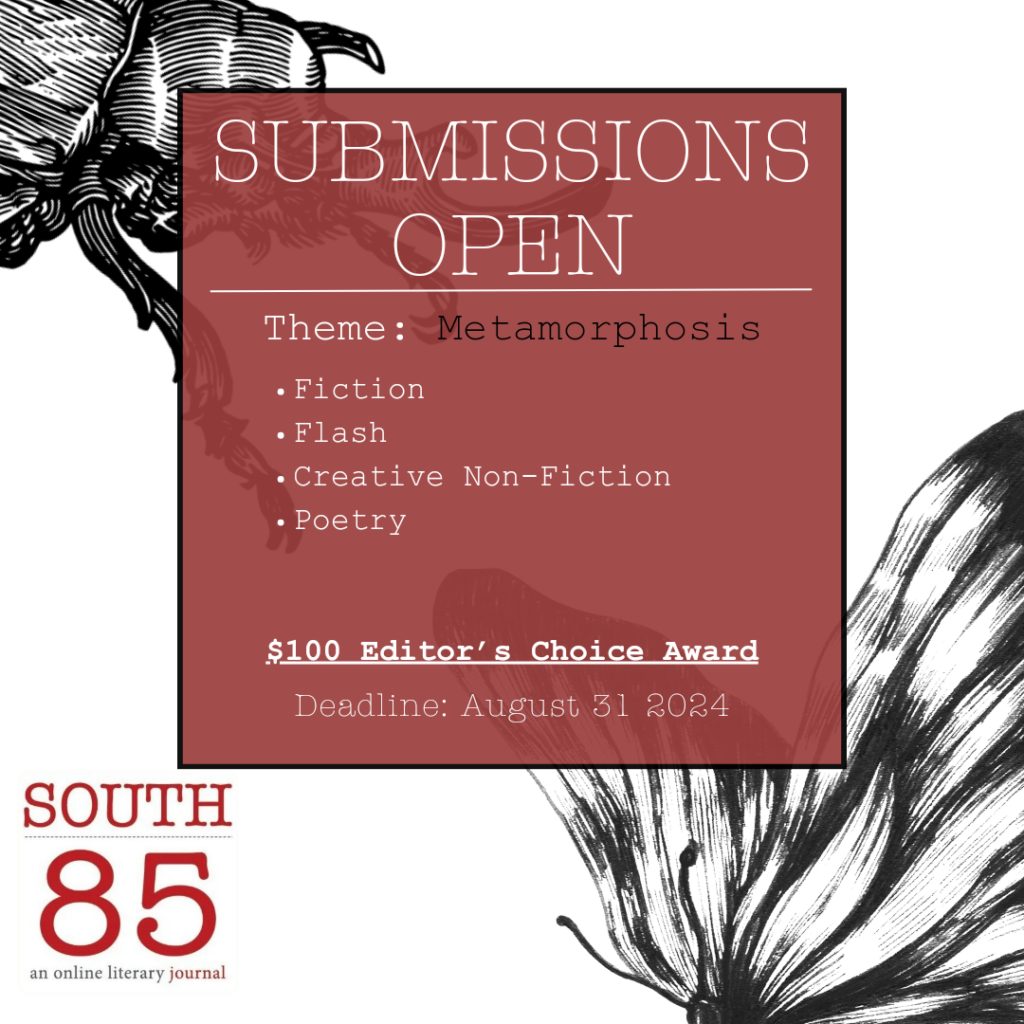
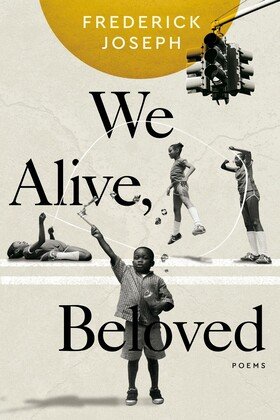
 Winning story: “As To Your Comment That It Could Have Been Worse” by Caridad Moro-Gronlier.
Winning story: “As To Your Comment That It Could Have Been Worse” by Caridad Moro-Gronlier.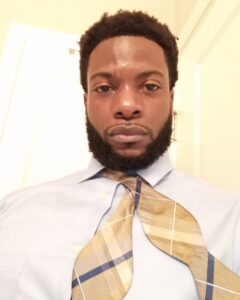 Winning Poem: “A Black Poet Looks Back at his Boyhood” by Oak Morse.
Winning Poem: “A Black Poet Looks Back at his Boyhood” by Oak Morse.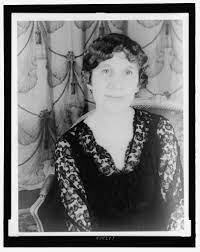
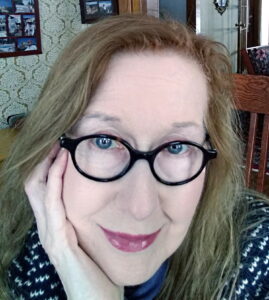 uzanne Cleary’s Crude Angel, her fourth full-length poetry collection, was published in November 2018 by BkMk Press (U of Missouri-Kansas City). Beauty Mark (BkMk 2013) won the John Ciardi Prize for Poetry, and also received the Eugene Paul Nassar Poetry Prize and the Patterson Award for Literary Excellence. Keeping Time (2002) and Trick Pear (2007) were published by Carnegie Mellon University Press. Poets Marilyn Nelson and Robert Cording selected her collection Blue Cloth as winner of the 2004 Sunken Garden Poetry Festival chapbook competition.
uzanne Cleary’s Crude Angel, her fourth full-length poetry collection, was published in November 2018 by BkMk Press (U of Missouri-Kansas City). Beauty Mark (BkMk 2013) won the John Ciardi Prize for Poetry, and also received the Eugene Paul Nassar Poetry Prize and the Patterson Award for Literary Excellence. Keeping Time (2002) and Trick Pear (2007) were published by Carnegie Mellon University Press. Poets Marilyn Nelson and Robert Cording selected her collection Blue Cloth as winner of the 2004 Sunken Garden Poetry Festival chapbook competition.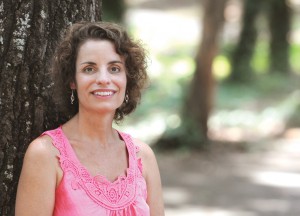 Susan Tekulve is author of Second Shift: Essays and In the Garden of Stone, winner of the 2012 South Carolina First Novel Prize and a 2014 Gold IPPY Award. She’s also published a short story collection, Savage Pilgrims, and two fiction chapbooks, Washday and My Mother’s War Stories. Her work appears in Denver Quarterly, Indiana Review, The Georgia Review, Connecticut Review, The Louisville Review, Puerto del Sol, New Letters, and Shenandoah.
Susan Tekulve is author of Second Shift: Essays and In the Garden of Stone, winner of the 2012 South Carolina First Novel Prize and a 2014 Gold IPPY Award. She’s also published a short story collection, Savage Pilgrims, and two fiction chapbooks, Washday and My Mother’s War Stories. Her work appears in Denver Quarterly, Indiana Review, The Georgia Review, Connecticut Review, The Louisville Review, Puerto del Sol, New Letters, and Shenandoah.
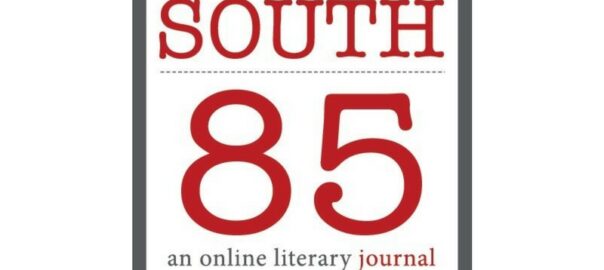

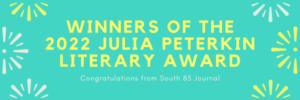
 Yellow Bird by Shannon Bowring. Bowring’s work has appeared in numerous journals, has been nominated for a Pushcart and a Best of the Net, and was selected for Best Small Fictions 2021. Her debut novel, The Road to Dalton, is forthcoming from Europa Editions. Shannon lives in Bath, Maine.
Yellow Bird by Shannon Bowring. Bowring’s work has appeared in numerous journals, has been nominated for a Pushcart and a Best of the Net, and was selected for Best Small Fictions 2021. Her debut novel, The Road to Dalton, is forthcoming from Europa Editions. Shannon lives in Bath, Maine. 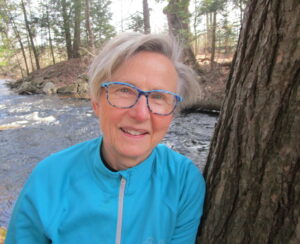 Feathers and Wedges: A Golden Shovel by Karen Kilcup. A New Englander with old farming roots, Karen Kilcup is the Elizabeth Rosenthal Excellence Professor of American Literature, Environmental & Sustainability Studies, and Women’s, Gender, & Sexuality Studies at UNC Greensboro. Her forthcoming poetry book The Art of Restoration was awarded the 2021 Winter Goose Poetry Prize. She’s an avid cook, runner, and rock climber who has difficulty resisting the urge for More Garden.
Feathers and Wedges: A Golden Shovel by Karen Kilcup. A New Englander with old farming roots, Karen Kilcup is the Elizabeth Rosenthal Excellence Professor of American Literature, Environmental & Sustainability Studies, and Women’s, Gender, & Sexuality Studies at UNC Greensboro. Her forthcoming poetry book The Art of Restoration was awarded the 2021 Winter Goose Poetry Prize. She’s an avid cook, runner, and rock climber who has difficulty resisting the urge for More Garden. Paraiso by
Paraiso by 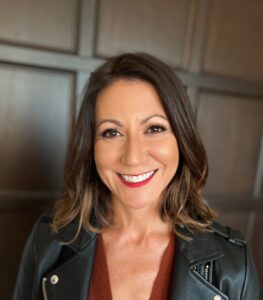 El Roca by Hayley Nivelle.
El Roca by Hayley Nivelle. 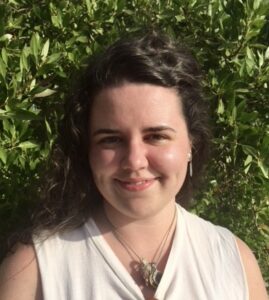 Santa Monica by
Santa Monica by 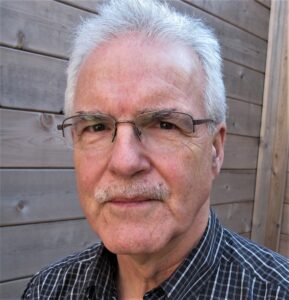 If I Get Alzheimer’s: Instructions for My Wife by Justin Hunt. Hunt grew up in rural Kansas and lives in Charlotte, NC. His work has won several awards and appears in a wide range of publications in the U.S., Ireland and the U.K., including Five Points, Barrow Street, River Styx, New Ohio Review, Nimrod, Terrain.org, and The Bridport Prize Anthology.
If I Get Alzheimer’s: Instructions for My Wife by Justin Hunt. Hunt grew up in rural Kansas and lives in Charlotte, NC. His work has won several awards and appears in a wide range of publications in the U.S., Ireland and the U.K., including Five Points, Barrow Street, River Styx, New Ohio Review, Nimrod, Terrain.org, and The Bridport Prize Anthology. 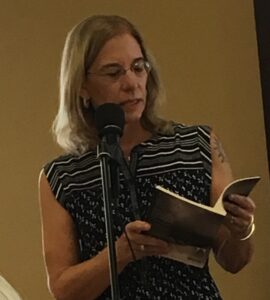 Elixir for Knowing When To Surrender by Katherine DiBella Seluja. Seluja is the author of Gather the Night, and co-author of We Are Meant to Carry Water. Recent work can be found in FENCE, and upcoming in Cutthroat and Thimble. Her third book of poetry, Point of Entry, will be published by UNM Press in 2023.
Elixir for Knowing When To Surrender by Katherine DiBella Seluja. Seluja is the author of Gather the Night, and co-author of We Are Meant to Carry Water. Recent work can be found in FENCE, and upcoming in Cutthroat and Thimble. Her third book of poetry, Point of Entry, will be published by UNM Press in 2023. a mother mulls her son’s self-injuries by Dean
a mother mulls her son’s self-injuries by Dean 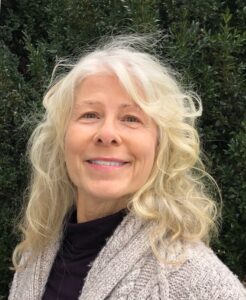 The judge for the 2022 Julia Peterkin Flash Fiction contest is Cary Holladay. Holladay has published six short story collections, including Horse People, The Quick-Change Artist, and most recently, Brides in the Sky, as well as two novels and over 100 short stories and essays in journals and anthologies, including Alaska Quarterly Review, Arkansas Review, Five Points, The Georgia Review, The Hudson Review, Kenyon Review, Prairie Schooner, Sewanee Review, Southern Review, and Tin House. Her awards include an O. Henry Prize and a fellowship from the National Endowment for the Arts. She is Professor Emeritus at the University of Memphis. She lives in Virginia.
The judge for the 2022 Julia Peterkin Flash Fiction contest is Cary Holladay. Holladay has published six short story collections, including Horse People, The Quick-Change Artist, and most recently, Brides in the Sky, as well as two novels and over 100 short stories and essays in journals and anthologies, including Alaska Quarterly Review, Arkansas Review, Five Points, The Georgia Review, The Hudson Review, Kenyon Review, Prairie Schooner, Sewanee Review, Southern Review, and Tin House. Her awards include an O. Henry Prize and a fellowship from the National Endowment for the Arts. She is Professor Emeritus at the University of Memphis. She lives in Virginia.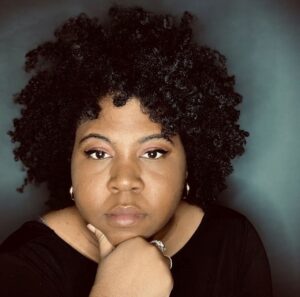 The judge for the 2022 Julia Peterkin is Ashley M. Jones. Jones is Poet Laureate of the state of Alabama (2022-2026). She received an MFA in Poetry from Florida International University (FIU), where she was a John S. and James L. Knight Foundation Fellow. She is the author of three poetry collections: REPARATIONS NOW! (Hub City Press, 2021); dark // things (Pleiades Press, 2019), winner of the Lena-Miles Wever Todd Prize for Poetry; and Magic City Gospel (Hub City Press, 2017), winner of the silver medal in poetry in the Independent Publishers Book Awards. Her poems and essay appear or are forthcoming in many journals and anthologies, including CNN, the Academy of American Poets, Poetry Magazine, Tupelo Quarterly, Prelude, and The Harvard Journal of African American Public Policy, among others.
The judge for the 2022 Julia Peterkin is Ashley M. Jones. Jones is Poet Laureate of the state of Alabama (2022-2026). She received an MFA in Poetry from Florida International University (FIU), where she was a John S. and James L. Knight Foundation Fellow. She is the author of three poetry collections: REPARATIONS NOW! (Hub City Press, 2021); dark // things (Pleiades Press, 2019), winner of the Lena-Miles Wever Todd Prize for Poetry; and Magic City Gospel (Hub City Press, 2017), winner of the silver medal in poetry in the Independent Publishers Book Awards. Her poems and essay appear or are forthcoming in many journals and anthologies, including CNN, the Academy of American Poets, Poetry Magazine, Tupelo Quarterly, Prelude, and The Harvard Journal of African American Public Policy, among others.